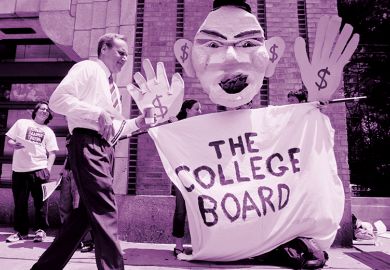For those with educational responsibilities, how we choose and promote learners is crucial. In universities, if we are asked how we select our students, we typically say that it is a case of identifying and building on raw talent. But what does that really mean? And does it bear scrutiny?
Dating back at least to biblical times, our species has had a notion of talent. Speaking broadly, talent was something inborn – a gift from God or the gods that allowed its possessor to perform extraordinarily well. And barring extraordinary circumstances, talent was expected to be readily noticed, developed and publicly displayed.
If the talent appeared in an offspring of privilege, it could be readily nurtured. And if it manifested itself in an unexpected place, neighbours were expected to lend a hand so that the talent could partake of educational opportunities. And so it remains in certain spheres, such as sports or the arts.
With respect to academic talent, more technical means of identification were introduced in the past century. Even if they lived in remote surroundings, young people with a high IQ or an unexpectedly high SAT score (or its overseas equivalents) would have the opportunity to study at first-rate institutions of higher learning. And, if the stars aligned, they could undertake a career in teaching, research and scholarship.
I contend that we should think about this issue in a quite different way. Instead of asking “Who is talented?” or “What is talent?”, we should ponder “Where is talent”? In so doing, we need to consider at least three entities: the person, the domain of expertise and the field of judges.
Regarding the person, psychological testing has led us to think of intellect as being singular, of a piece. But we now recognise that there are various spheres of intellect – what I have called multiple intelligences. A person may be strong in language but not in mathematical thinking, or vice versa. And neither of those strengths or weaknesses predicts how the person will perform in an art form like music, or in understanding other people (often called social intelligence) or themselves (sometimes called emotional intelligence).
In short, individuals can have quite different intellectual strengths and weaknesses. Moreover, there are other issues of character, will and motivation that determine whether talents will develop and how they will be deployed.
Just as individuals can be intelligent in various ways, they can excel in a multiplicity of domains, spheres or sectors. Even within the academy, it takes quite different skills to become an expert physicist or chemist, as opposed to an esteemed historian or philosopher – let alone an outstanding lawyer, doctor, engineer or teacher. Each of these domains has its own set of requirements for training – and a still further set of skills and desiderata come into play when it comes to leadership or collaboration.
It is also important to bear in mind that these skills and desiderata change over time. Looking at institutions of higher learning, we might say that until the 20th century, skills in language were primary. In the 20th century, mathematical and scientific thinking became valorised. In our time, both computational and interpersonal skills are at a premium. And perhaps, looking ahead, as AI and deeper learning tools gain in power and versatility, we may look for yet different human skills – or perhaps human-cum-device skills.
In an ideal world, talent and expertise might speak for themselves. But in every sector of which I am aware, across the arts and sciences, there are individuals and rules that determine how talent is noticed and evaluated – and, therefore, who is given an opportunity, who is promoted and who is rewarded – and, conversely, who is denied those opportunities. Those rules, moreover, are highly time- and culture-bound. For example, while the field judging painting talent in the 18th century would have favoured realism, it would not have done so in the 20th century.
We would like to think that these judgements are entirely objective. But even when obvious favouritism and bias are eliminated, judges are rarely neutral: often, they favour individuals like themselves – or, in an effort to counter bias, they may go to the opposite extreme. Presumably, in the past, many potentially excellent students and scholars were overlooked, precisely because they did not resemble the archetypal talented young person.
So identifying and nurturing talent is not simply a case of looking for markers and pushing along those so marked. All three nodes of the talent triangle must be taken into account, and their interaction noted.
Moreover, our job as educators is not simply to identify and nurture talent. We need to do more. We need to form individuals who will use their talents to do the right thing. To do this, we must exemplify and reward the models of human behaviour and character that we desire in our future workers and leaders – and sanction those of which we disapprove.
History shows that talent devoid of ethical character may just as easily bring humanity to its knees in gas chambers as enable giant leaps for mankind in spacesuits.
Howard Gardner is the John H. and Elisabeth A. Hobbs research professor of cognition and education at Harvard University’s Graduate School of Education. He will be speaking on a panel about new definitions of talent at Times Higher Education’s World Academic Summit at ETH Zurich on 10 to 12 September, whose theme is how talent thrives. He is grateful to his teacher, Nelson Goodman, and his colleague, Mihaly Csikszentmihalyi, for suggesting how to go beyond a simple definition of talent.
POSTSCRIPT:
Print headline: Nurturing to do the right thing
Register to continue
Why register?
- Registration is free and only takes a moment
- Once registered, you can read 3 articles a month
- Sign up for our newsletter
Subscribe
Or subscribe for unlimited access to:
- Unlimited access to news, views, insights & reviews
- Digital editions
- Digital access to THE’s university and college rankings analysis
Already registered or a current subscriber?







